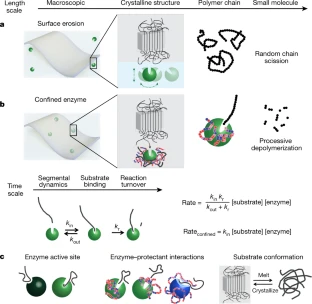Science Daily April 21, 2021
The process developed by a team of researchers in the US (UC Berkeley, Lawrence Berkeley National Laboratory, UMass Amherst) involves embedding polyester-eating enzymes in the plastic as it is made. When exposed to heat and water, an enzyme starts chomping the plastic polymer into its building blocks. In the case of biodegradable plastics, which are made primarily of the polyester known as polylactic acid, or PLA, it reduces it to lactic acid that can feed the soil microbes in compost. The polymer wrapping also degrades. The process eliminates microplastics, a byproduct of many chemical degradation processes. Up to 98% of the plastic made using this technique degrades into small molecules. These results provide a foundation for the rational design of polymeric materials that could degrade over relatively short timescales. The study provides molecular guidance towards enzyme–polymer pairing and the selection of enzyme protectants to modulate substrate selectivity and optimize biocatalytic pathways…read more. TECHNICAL ARTICLE

Biocatalysis with embedded enzyme for polymer degradation. Credit: Nature volume 592, pages558–563(2021)